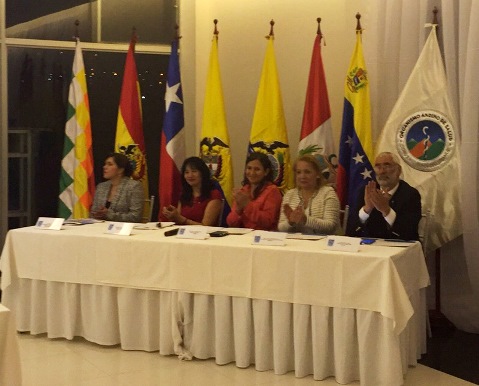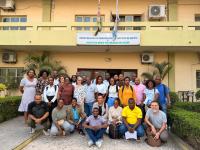Inauguration of the Andean Observatory on Medicines Highlights Regulation and Research in Health
 With the purpose of responding to the needs of countries of the Andean area in order to ensure the access to quality and efficient medicines at a low cost, the electronic platform of the Andean Observatory on Medicines was launched in Cochabamba (Bolivia), on October 13. The mechanism was developed by the Executive Secretariat and by the Subregional Technical Commission on Policies for the Access to Medicines of ORAS-CONHU, and received support from PAHO Bolivia, as well as contributions from the Ministries of Health of the region. The strategic points of the Andean policy for medicines outlined the four central axes that constitute the Observatory: the access to medicines; quality, efficiency and safety; the rational use of medicines; research and development.
With the purpose of responding to the needs of countries of the Andean area in order to ensure the access to quality and efficient medicines at a low cost, the electronic platform of the Andean Observatory on Medicines was launched in Cochabamba (Bolivia), on October 13. The mechanism was developed by the Executive Secretariat and by the Subregional Technical Commission on Policies for the Access to Medicines of ORAS-CONHU, and received support from PAHO Bolivia, as well as contributions from the Ministries of Health of the region. The strategic points of the Andean policy for medicines outlined the four central axes that constitute the Observatory: the access to medicines; quality, efficiency and safety; the rational use of medicines; research and development.
In the area of research, the Observatory combines aspects of the traditional medicine of the Andean peoples with current health practices, through the study of medicinal plants of the region and through the regulation of local good practices. The minister of health of Bolivia, Ariana Campero Nava, highlighted the importance of the Andean ancient medicine nowadays and remarked that the region could not remain static with regard to an area that, for several years, has demonstrated to be efficient and enabled the access to health and medicines for the Andean population. “These researches must also be carried out within our region, with our cultures and our histories”, she observed.
The minister also pointed out that the regulation of medicines is still a great concern for the Andean region, and that the conjoint work of international organisms together with the ministries of health is essential in order to continue with the identification of existing problems regarding the indiscriminate use and commercialization of medicines. “We must also support the national industries so that they keep following good manufacturing practices […] this subject must overcome, transcend all commercial and financial interests. Health is not a business, it is a fundamental human right”, she stated.
To the Executive Secretary of ORAS-CONHU, Caroline Chang, the comprehensive perspective of the Observatory over different areas of medicines turns it into a mechanism that is not exclusively built for the use of the Andean countries. According to her, it is possible to collect information related to prices, rules, regulations, and in the case of quality, also data about manufacturing practices of each one of the countries, their rules and regulations, and give notice about possible risk situations in the field of medicines. “It is an Andean tool available to the whole region of the Americas”, she said.
The proposal of the Observatory converges with the project of UNASUR’s Medicine Price Database, which also aims to foster regional public policies related to the production and to the access to quality medicines. Likewise, Caroline mentioned that the Andean mechanism can contribute to the South American initiative. “With regard to the issue of access, there is a specific price observatory that already has the price database of six countries. Thus, the Andean observatory can complement it and serve as a base or as a linkage for UNASUR’s price database”.
The event that launched the Andean Observatory on Medicines also counted with the presence of the representative for PAHO Bolivia, Dr Fernando Leanes, the representative for the Subregional Technical Commission on Policies for the Access to Medicines of ORAS-CONHU, Dr Ericka Toledo, members from the Ministries of Health of the region, from ISAGS, COMISCA and from the civil society.
For more information about the Andean Observatory on Medicines, click here.



